This website uses cookies so that we can provide you with the best user experience possible. Cookie information is stored in your browser and performs functions such as recognising you when you return to our website and helping our team to understand which sections of the website you find most interesting and useful.
Curating a Connected, Compliant Data and Software Landscape for Life Sciences Companies

In our industry survey, we found that life sciences companies want their ERP software to help them gain efficiencies and move fast. It also has to fit well into their existing technology landscape. Life sciences companies would like technology vendors to be responsive, offering strong support and helping them gain insight from data. The Sikich life sciences team has a successful track record of meeting these expectations for systems and vendors. As we discuss below, we also have the expertise to help companies achieve software validation—a critical concern mentioned by many survey participants—and simplify their technology environments.
Goals and aspirations for ERP and technology vendors
Improving efficiencies is the top goal when life sciences companies responding to our survey state their objectives for implementing new software. Given the technology challenges they experience, it’s not surprising that system flexibility and integration capabilities would round out the top-three. In our work with life sciences clients, we often see that speed and efficiency are paramount for them. Lengthy ERP or other technology deployments are typically unacceptable. With Sikich SuiteSuccess for Life Sciences, our industry-optimized ERP solution based on NetSuite, we can help them get to go-live quickly, within 60 to 90 days. As we review their processes and plan an implementation, we automate and streamline as much as we can to reach the level of efficiency they hope for.
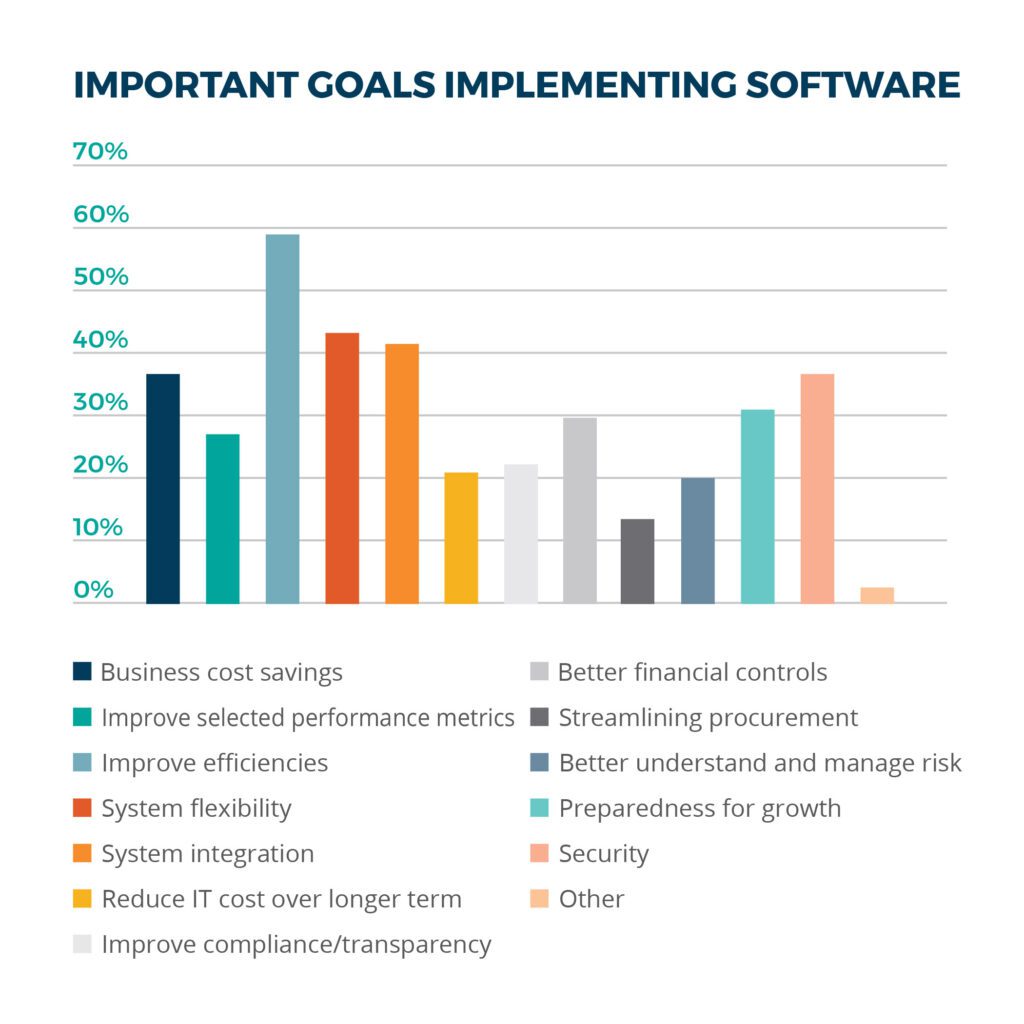
For these fast-moving life sciences organizations, cost savings and security are not as critical as efficiencies in terms of the survey. However, as we hear from them, those are still critical considerations. Many of these companies need to protect high-value data and strictly correlate their expenditures to business outcomes. But they also know that modern cloud technology already offers a suite of security capabilities that are continuously being strengthened and updated by the leading providers. Compared to on-premises ERP software, many security risks are already mitigated for them in their cloud ERP. We can help them remedy any remaining, specific vulnerabilities that SuiteSuccess for Life Sciences might not address out-of-the-box.
The drive toward speed and efficiency in many life sciences firms requires business users to take control over their technology. IT teams aren’t always closely involved in SuiteSuccess for Life Sciences deployments or the ongoing management of the ERP system. They play more of an enabling role, paving the way for business users. Sikich consultants work with IT to create IT general controls (ITGC) that help a life sciences company simplify the administrative workloads of technology while making certain that it meets their business needs. Sometimes, these clients also decide to make use of our IT managed services.
Following an ERP deployment, we often help life sciences companies prepare for the future, in which their readiness for equity events and commercialization is critical. Building on our expertise from hundreds of projects, we assist these clients ready manufacturing, inventory management, and other processes for their business journey.
Choosing a Technology Vendor
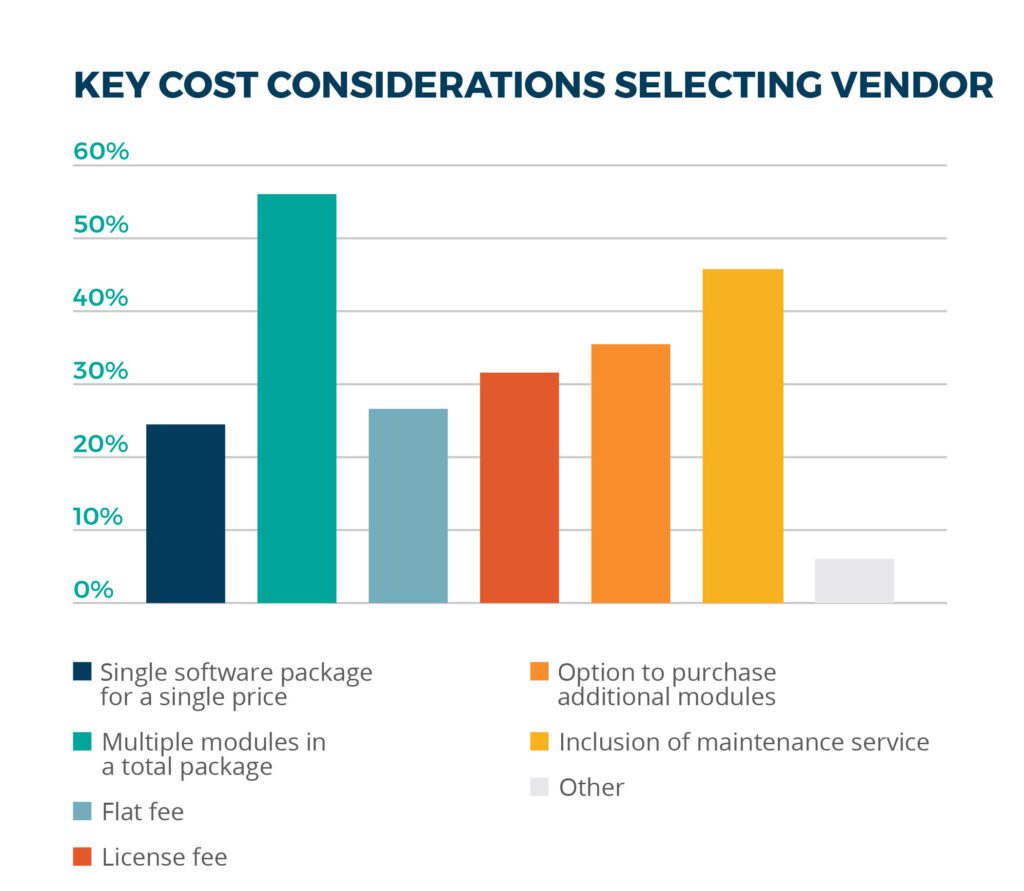
In choosing an ERP vendor, the survey finds that many life science companies look for a comprehensive solution in a “total package.” Maintenance is also important, and, when it comes to their wish list for ERP vendors outside of purely technical considerations, support is the most important capability they require.
For Sikich consultants, these support and maintenance needs are always top-of-mind in life sciences engagements. Companies prize responsiveness, both ours and their own in communicating with their customers and business partners. To deliver on that account, Sikich provides a single point of contact clients can always reach and count on, not a ticketing system that may distribute responses and follow-up tasks among employees in a service team.
While SuiteSuccess for Life Sciences provides a comprehensive ERP suite, many clients look to us to augment and refine it based on our expertise. That often means finding ways to help them accelerate their momentum and learn from other companies’ best practices in using ERP or optimizing their processes. As much as possible, we match the pace of these clients, resolving any concerns immediately and in one interaction.
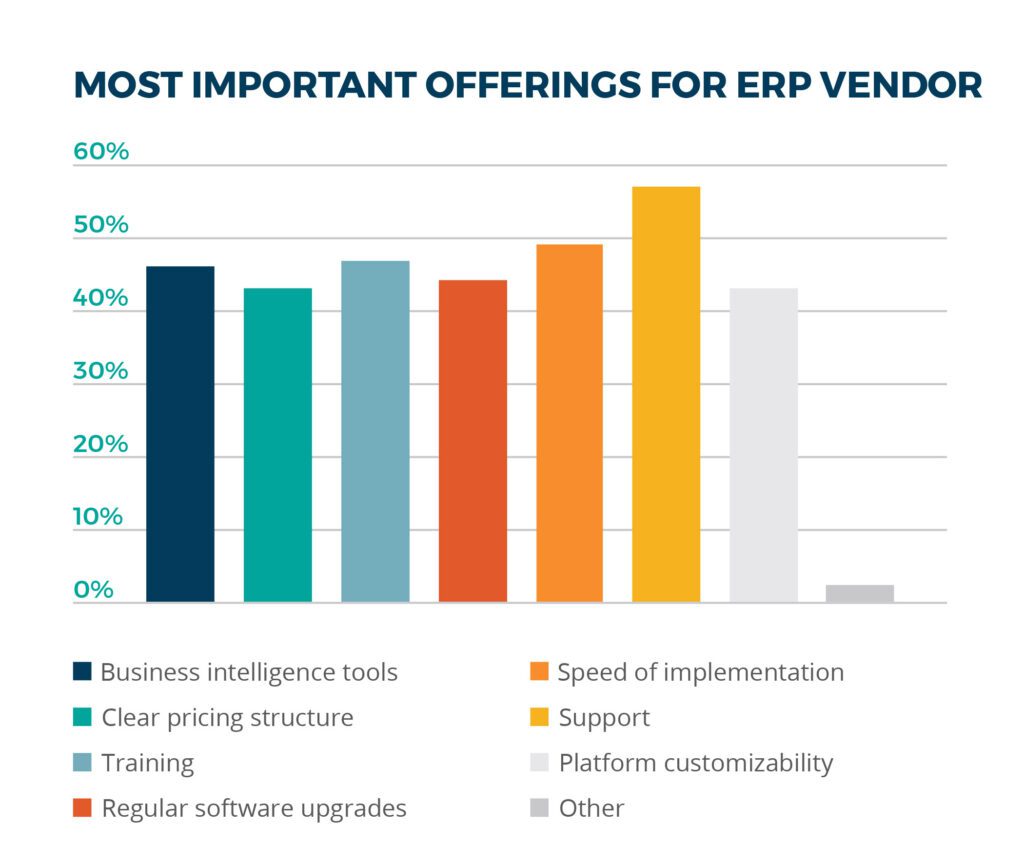
Mitigating the risk of software validation
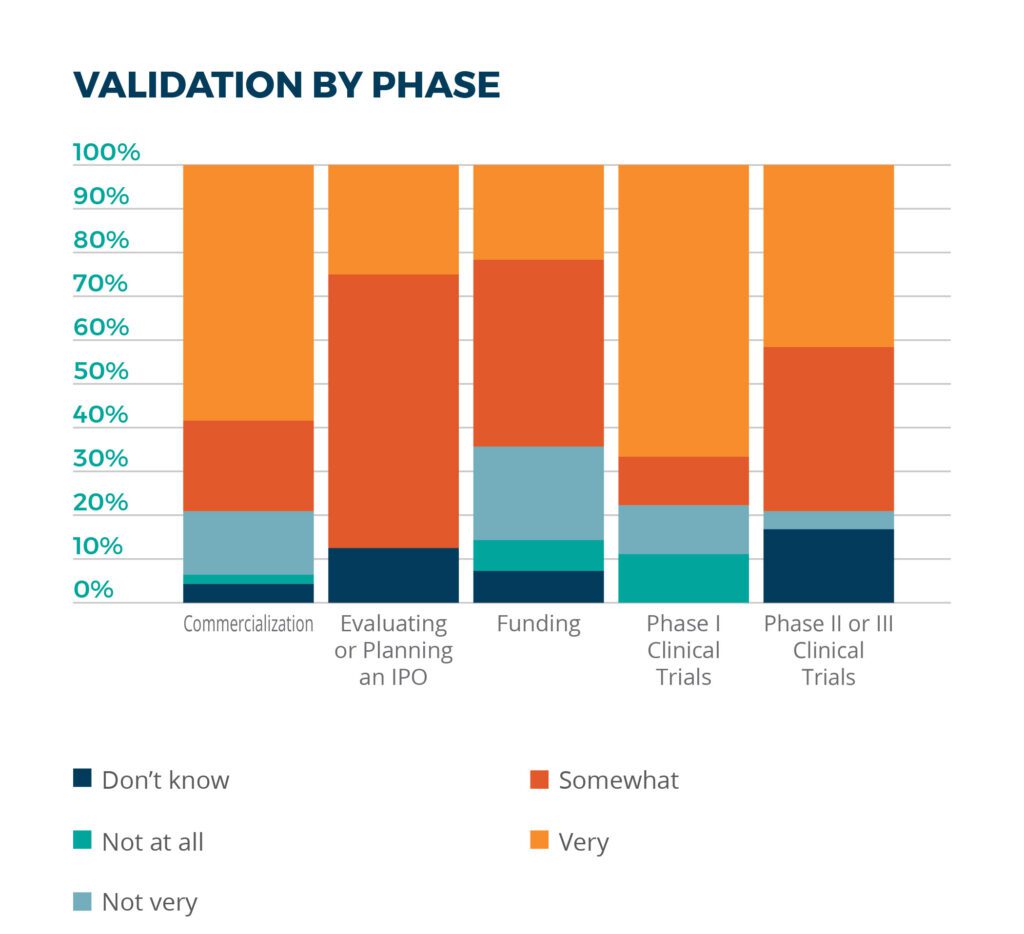
Software validation to ensure compliance with FDA and other regulatory mandates was important to practically everyone participating in the survey, and it was also a critical concern when life science companies considered cloud technology.
Some larger life science organizations have their own quality department, whose experts take care of validations. But not every company is ready to commit the significant budget and resources this requires. The Sikich compliance advisory team works hand-in-hand with the ERP consultants and our clients to provide expert, rock-solid validation and quality control for companies’ software systems. Realizing FDA process and software verification and validation is a complex, business-critical undertaking where oversights and errors are not acceptable. As our clients’ compliance partner, we provide assurance and certainty, addressing a substantial risk and ensuring validation with greater cost and resource efficiency than if they had to set up and staff their own compliance and quality teams.
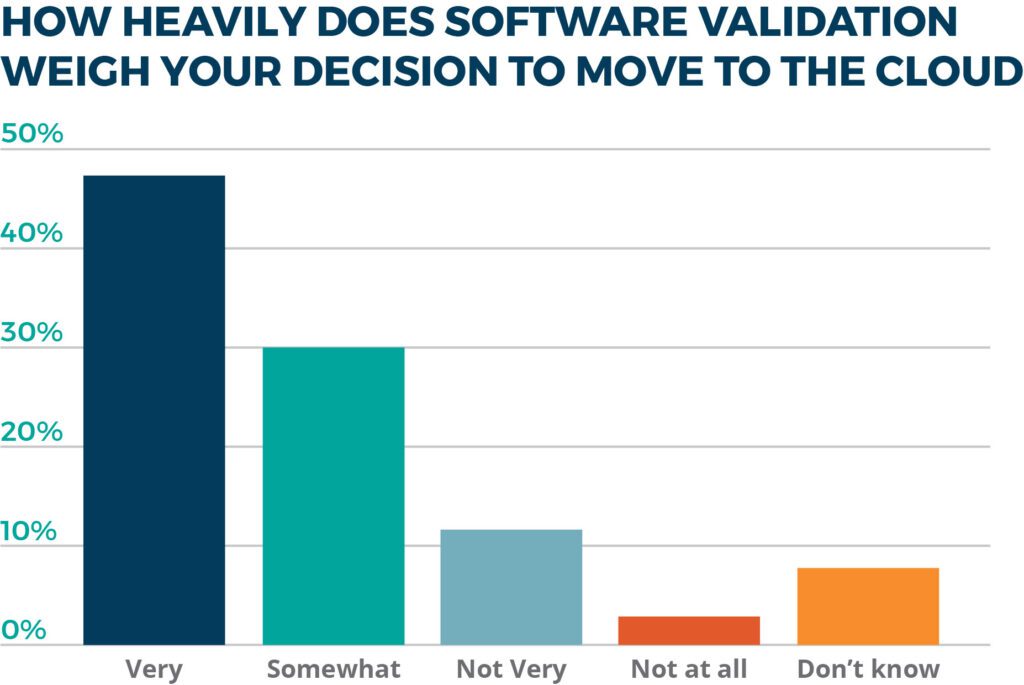
Does it matter how many software systems a company runs?
The more software systems life sciences companies operate to manage their business—especially software tools that are not integrated—the more they need to be prepared to address potential data quality and data management issues. And, when too many users need to navigate multiple software tools, their experience quality declines, and processes tend to take longer and suffer from more errors.
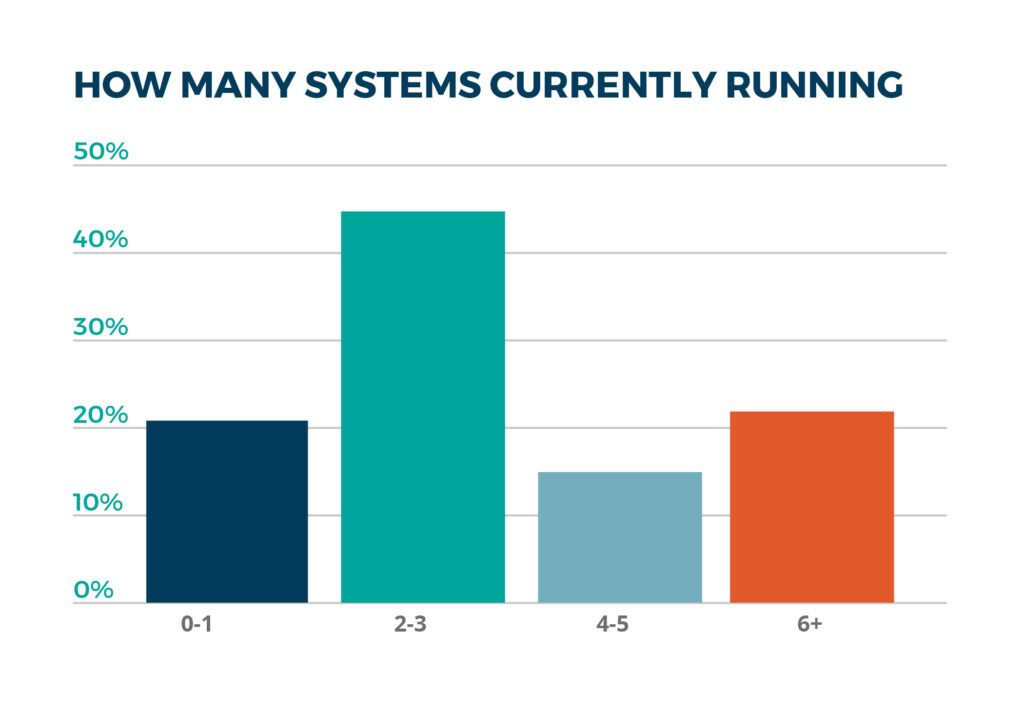
When a life sciences company uses many stand-alone software tools, it’s almost impossible to avoid that technology users operate from a limited perspective, which makes it harder for them to move ahead as one coherent organization. It’s therefore reassuring that relatively few survey respondents rely on more than six software systems and many use just two to three.
In our work with life sciences clients, we avoid data and technical fragmentation as much as possible. We also aim to provide them with complete visibility of information and business activities. With SuiteSuccess for Life Sciences, we can deliver a best-in-class ERP solution that can serve as the primary data source for an entire organization. It already comes with prebuilt reporting and analytics tools, and we train clients in how to bring more data insight to certain roles or processes—unless they prefer to have us extend the ERP environment for that purpose.
Integrations for Software Tools
When it’s necessary for life sciences organizations to use several software tools, we recommend the most robust and mature solutions available. We then enable a free flow of information through integrations, such as connecting SuiteSuccess for Life Sciences with Coupa Business Spend Management software. Based on our understanding of clients’ goals, we maintain future-resiliency in the technology and process optimizations we provide. We are always mindful of a company’s upcoming equity events and other milestones when we deploy and configure software tools and build integrations, so the technology can scale and flex to deliver data and user empowerment for years to come.
Next steps
To gain more insight and explore technology opportunities for your life sciences organization, you can:
- Download the complete survey report by Pharmaceutical Executive and Sikich.
- See how Sikich supports life sciences companies.
- Read the other blog posts in this series.
- Talent, Growth, and Transformation: Life Sciences Companies Discuss the Role of Technology in Their Business
- What Kind of Technology Do Life Sciences Companies Rely Upon Most and When?
- Data Insight Is Always Critical: Understanding the Technology Priorities of Life Sciences Companies
- Software Opportunities and Challenges in the Life Sciences Industry
- Contact Sikich.
This publication contains general information only and Sikich is not, by means of this publication, rendering accounting, business, financial, investment, legal, tax, or any other professional advice or services. This publication is not a substitute for such professional advice or services, nor should you use it as a basis for any decision, action or omission that may affect you or your business. Before making any decision, taking any action or omitting an action that may affect you or your business, you should consult a qualified professional advisor. In addition, this publication may contain certain content generated by an artificial intelligence (AI) language model. You acknowledge that Sikich shall not be responsible for any loss sustained by you or any person who relies on this publication.




